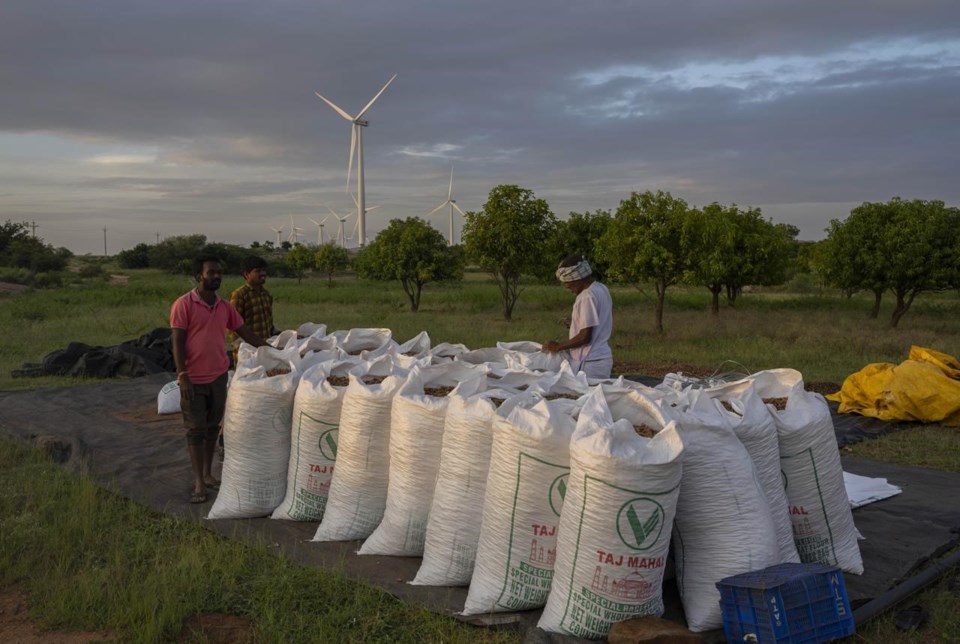BENGALURU, India (AP) ΓÇö India officially takes up its role as chair of the Group of 20 leading economies for the coming year Thursday and it's putting climate at the top of the group's priorities.
Programs to encourage sustainable living and money for countries to transition to clean energy and deal with the effects of a warming world are some of the key areas that India will focus on during its presidency, experts say. Some say India will also use its new position to boost its climate credentials and act as a bridge between the interests of industrialized nations and developing ones.
The country has made considerable moves toward its climate goals in recent years but is currently one of the world's top emitters of planet-warming gases.
The G-20, made up of the world's largest economies, has a rolling presidency with a different member state in charge of the group's agenda and priorities each year. Experts believe India will use the ΓÇ£big stageΓÇ¥ of the G-20 presidency to drive forward its climate and development plans.
The country ΓÇ£will focus heavily on responding to the current and future challenges posed by climate change,ΓÇ¥ said Samir Saran, president of the Observer Research Foundation, a New Delhi-based think tank. The ORF will be anchoring the T-20 ΓÇö a group of think tanks from the 20 member countries whose participants meet alongside the G-20.
Saran said that India will work to ensure that money is flowing from rich industrialized nations to emerging economies to help them combat global warming, such as a and .
He added that India will also use the presidency to push that encourages more sustainable lifestyles in the country, which is set to soon become most populous in the world.
When outgoing chair Indonesia symbolically handed the presidency to India in Bali last month by passing the gavel, Prime Minister Narendra Modi took the opportunity to promote the program, saying it could make ΓÇ£a big contributionΓÇ¥ by turning sustainable living into ΓÇ£a mass movement."
The impact of lifestyle "has not received as much attention in the global discourse as it should," said RR Rashmi, a distinguished fellow at The Energy Research Institute in New Delhi. He added that the issue "may get some prominenceΓÇ¥ at the G-20 which would be a success for the Indian government, but critics say the focus on lifestyle changes must be backed by policy to have credibility.
India has been beefing up its climate credentials, than the goals it submitted to the U.N. as part of the Paris Agreement, which requires countries to show how they plan to .
Analysts say nations' climate ambitions and actions ΓÇö including India's ΓÇö are .
Many of IndiaΓÇÖs big industrialists are investing heavily in renewable energy domestically as well as globally, but the Indian government is also preparing to invest in coal-based power plants at the cost of $33 billion over the next four years.
At the , India ΓÇö currently the worldΓÇÖs third largest emitter of greenhouse gases ΓÇö proposed a phaseout of all fossil fuels and repeatedly emphasized the need to revamp global climate finance. The country says it cannot reach its climate goals and reduce carbon dioxide emissions without significantly more finance from richer nations, a claim which those countries dispute.
Navroz Dubash, author of several U.N. climate reports and professor at the Centre for Policy Research, said that a key question for many countries is how ΓÇ£emerging economies address development needs and do it in a low carbon pathwayΓÇ¥ with several in the global south, like India, pointing to a need for outside investment.
As the chair of the G-20, India is a good position ΓÇ£to say what it will take for us to develop in ways that donΓÇÖt lock up the remaining carbon budget,ΓÇ¥ Dubash added, referring to the amount of carbon dioxide the world can emit while still containing global warming within 1.5 degrees Celsius (2.7 Fahrenheit) compared with preindustrial levels.
ΓÇ£Developing countries are making a convincing case that green industrial policies are actually quite dependent on having public money to throw at the problems," said Dubash. Some experts say more than to help developing countries cut emissions and deal with the effects of a warming climate, with $1 trillion from domestic sources and the rest coming from external sources such as developed countries or multilateral development banks.
"This public money can also be a way of getting in private money, which is what the U.S. has done in ,ΓÇ¥ Dubash added. The includes incentives for building out clean energy infrastructure.
The G-20 will also be looking closely at alternative means to getting climate finance, experts say. The group could potentially take a leaf out of , Mia Mottley, which involves unlocking large sums of money from multilateral development banks and international financial institutions to help countries adapt to climate change and transition to cleaner energy.
ORF's Saran said that as G-20 chair India can help move forward the conversation on the initiative. Developing countries are often charged higher rates of interest when borrowing from global financial institutions. Rejigging global finance to make renewable energy more affordable in the developing world is key to curbing climate change, Saran said.
The idea has recently gained traction amongst developed nations, with France's Macron recently vocalizing his support.
ΓÇ£A large share of emissions will come from the developing world in the future," Saran said. ΓÇ£If we make it easier for them to shift to clean energy, then these emissions can be avoided.ΓÇ¥
___
Follow Sibi Arasu on Twitter at
___
Associated Press climate and environmental coverage receives support from several private foundations. See more about APΓÇÖs climate initiative . The AP is solely responsible for all content.
Sibi Arasu, The Associated Press




